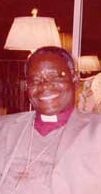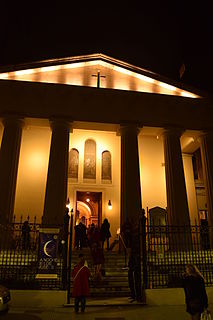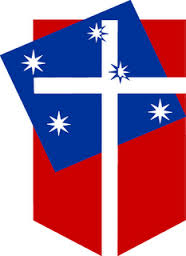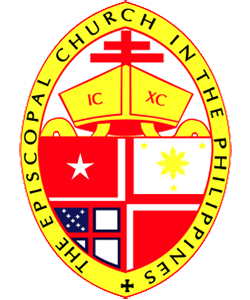Related Research Articles

Peter Jasper Akinola is the former Anglican Primate of the Church of Nigeria. He is also the former Bishop of Abuja and Archbishop of Province III, which covered the northern and central parts of the country. When the division into ecclesiastical provinces was adopted in 2002, he became the first Archbishop of Abuja Province, a position he held until 2010. He is married and a father of six.
The Anglican Church of Mexico, originally known as Church of Jesus, is the Anglican province in Mexico and includes five dioceses. The interim primate is Enrique Treviño, Bishop of Cuernavaca. Although born in Mexico and not being the result of any foreign missionary effort, the shield of the denomination uses the colors representing Mexico as well as those of the Episcopal Church (US) recognizing its historical connection with the US church since obtaining the apostolic succession from the US-based Anglican church.

The Anglican Communion Primates' Meetings are regular meetings of the primates in the Anglican Communion, i.e. the principal archbishops or bishops of each ecclesiastical province of the Anglican Communion. There are currently 38 primates of the Anglican Communion. The primates come together from the geographic provinces around the world for discussion and consultation. As primus inter pares of the communion, the Archbishop of Canterbury chairs the meetings, with the Secretary General of the Anglican Consultative Council (ACC) serving as secretary.

The Anglican Church of Papua New Guinea is a province of the Anglican Communion. It was created in 1977 when the Province of Papua New Guinea became independent from the Province of Queensland in the Church of England in Australia following Papua New Guinea's independence in 1975.

The Anglican Church of South America is the ecclesiastical province of the Anglican Communion that covers six dioceses in the countries of Argentina, Bolivia, Paraguay, Peru, and Uruguay.

The Anglican Episcopal Church of Brazil is the 19th province of the Anglican Communion, covering the country of Brazil. It is composed of nine dioceses and one missionary district, each headed by a bishop, among whom one is elected as the Primate of Brazil. The current Primate is Naudal Alves Gomes. IEAB is the oldest non-Roman Catholic church in Brazil, originating from the Treaty of Commerce and Navigation signed in 1810 between Portugal and the United Kingdom which allowed the Church of England to establish chapels in the former Portuguese colony. In 1890 American missionaries from the Episcopal Church established themselves in the country aiming to create a national church; unlike the English chapels, they celebrated services in Portuguese and converted Brazilians. The Anglican community of Brazil was a missionary district of the Episcopal Church until 1965, when it gained its ecclesiastical independence and became a separate province of the Anglican Communion. Twenty years later, IEAB began to ordain women. It preaches a social gospel, being known for its commitment to fight against problems that affect vast portions of the Brazilian society, such as social inequality, land concentration, domestic violence, racism, homophobia and xenophobia. Its stance as an Inclusive Church has caused both schisms and the arrival of former Roman Catholics and Evangelicals in search of acceptance.

The Anglican ministry is both the leadership and agency of Christian service in the Anglican Communion. "Ministry" commonly refers to the office of ordained clergy: the threefold order of bishops, priests and deacons. More accurately, Anglican ministry includes many laypeople who devote themselves to the ministry of the church, either individually or in lower/assisting offices such as lector, acolyte, sub-deacon, Eucharistic minister, cantor, musicians, parish secretary or assistant, warden, vestry member, etc. Ultimately, all baptized members of the church are considered to partake in the ministry of the Body of Christ.
The Anglican realignment is a movement among some Anglicans to align themselves under new or alternative oversight within or outside the Anglican Communion. This movement is primarily active in parts of the Episcopal Church in the United States and the Anglican Church of Canada. Two of the major events that contributed to the movement were the 2002 decision of the Diocese of New Westminster in Canada to authorise a rite of blessing for same-sex unions, and the nomination of two openly gay priests in 2003 to become bishops. Jeffrey John, an openly gay priest with a long-time partner, was appointed to be the next Bishop of Reading in the Church of England and the General Convention of the Episcopal Church ratified the election of Gene Robinson, an openly gay non-celibate man, as Bishop of New Hampshire. Jeffrey John ultimately declined the appointment due to pressure.

Alan Edwin Thomas Harper, is a retired Anglican bishop. He served in the Church of Ireland as Archbishop of Armagh and Primate of All Ireland from 2007 to 2012.

The Episcopal Church in the Philippines is a province of the Anglican Communion comprising the country of the Philippines. It was established by the Episcopal Church of the United States in 1901 by American missionaries led by Charles Henry Brent, who served as the first resident bishop, when the Philippines was opened to Protestant American missionaries. It became an autonomous province of the Anglican Communion on May 1, 1990.

The Parish of the Falkland Islands is an extra-provincial church in the Anglican Communion. In 1869, the "Diocese of the Falkland Isles" with jurisdiction over the rest of South America except for British Guiana was established. The name was due to a legal technicality: at that time there was no way an English bishop could be consecrated for areas outside the jurisdiction of the Crown. From the start, the bishop resided in Buenos Aires and had his administrative office there. From 1902 to 1973, the jurisdiction of the diocese was progressively reduced in area as more dioceses were established in South America and after the formation of the "Consejo Anglicano Sudamericano" in 1973 as a step towards the formation of a new province of the Anglican Communion the Parish became extra-provincial under the direct jurisdiction of the Archbishop of Canterbury. Until the war between Britain and Argentina in 1982, at the Archbishop's request episcopal functions were performed by the Anglican Bishop of Argentina.
Gregory James Venables is an English Anglican bishop. He has served as the Primate of the Southern Cone in South America from 2001 until 2010, and once again since 2016 until 2020. He is the former diocesan bishop of Argentina since November 2020.
John Alexander Ellison retired British Anglican bishop. He was the Bishop of Paraguay from 1988 to 2007.
David Leake was the assistant Bishop in Northern Argentina from 1969 to 1979 when he became diocesan Bishop, and, for the latter part of that post, also Primate of the Southern Cone.
Malcolm Alfred Warden Harding is an English-born Canadian Anglican Bishop. He was the fifth Bishop of Brandon at the Anglican Church of Canada from 1992 to 2001.
Ronald Curry Ferris is a Canadian Anglican bishop. A former bishop of the Anglican Church of Canada, he now serves as an assistant bishop of the Anglican Network in Canada. He is married to Jan, has six adult children and several grandchildren, and lives in Langley, British Columbia.
Ewen Donald Cameron is an Australian retired Anglican bishop who served as an assistant bishop in the Anglican Diocese of Sydney. He was the Bishop of North Sydney from 1983 to 1990, and the Diocesan Registrar from 1990 to 1993.
Héctor Tito Zavala Muñoz is a Chilean Anglican bishop. He was the first native Bishop of the Anglican Diocese of Chile and later the first Latin American Presiding Bishop of the Anglican Church of the Southern Cone of America, renamed in 2014 as the Anglican Church of South America. When the new Anglican Church of Chile was inaugurated in 2018 he became its first Presiding Bishop, also known as Archbishop by the Anglican Communion News Service. He is married to Miriam and they have three adult children.

Henry Chukwudum Ndukuba is a Primate of the Church of Nigeria. Prior to his appointment, he was Archbishop of Jos and Bishop of Gombe.
The Anglican Church of Chile is the ecclesiastical province of the Anglican Communion that covers four dioceses in Chile. Formed in 2018, the province is the 40th and the newest in the Anglican Communion. The province consists of four dioceses. Its primate and metropolitan is the Archbishop of Chile, Tito Zavala.
References
- ↑ Crockford's clerical directory 2008/2009 (100th edition), Church House Publishing ( ISBN 978-0-7151-1030-0)
- ↑ Church details